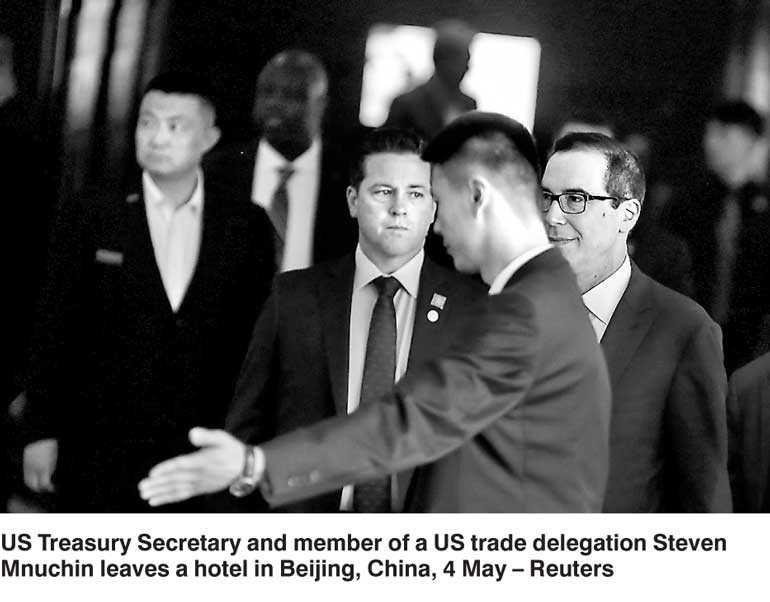Thursday Feb 19, 2026
Thursday Feb 19, 2026
Saturday, 5 May 2018 00:06 - - {{hitsCtrl.values.hits}}

BEIJING (Reuters): A US trade delegation in China has been having very good conversations, U.S. Treasury Secretary Steven Mnuchin said on Friday, as he headed into the second and likely last day of talks in Beijing.
A breakthrough deal to fundamentally change China’s economic policies is viewed as highly unlikely during the two-day visit, though a package of short-term Chinese measures could delay a U.S. decision to impose tariffs on about $50 billion worth of Chinese exports.
The discussions, led by Mnuchin and Chinese Vice Premier Liu He, are expected to cover a wide range of U.S. complaints about China’s trade practices, from accusations of forced technology transfers to state subsidies for technology development.
“We are having very good conversations,” Mnuchin told reporters as he left his hotel. He made no other remarks.
China, which has threatened retaliation in equal measure, including tariffs on U.S. soybeans and aircraft, has so far given no comment on how the talks are going.
“I understand the talks are still ongoing,” Chinese foreign ministry spokeswoman Hua Chunying said on Friday, when asked if there were any outcomes from the trade talks.
“At the moment I have no specific information to provide,” she said at a daily news briefing in Beijing.
The official China Daily newspaper said in a Friday editorial that the brewing tensions between the two countries underscored how “niggly” differences had become and “how difficult it will be for the two sides to walk away happy”.
It added “fingers would be crossed” around the world that a deal could be stuck because “failure would herald a slug fest of tariffs that would leave global trade reeling”.
US President Donald Trump on Thursday praised his relationship with Chinese President Xi Jinping as the USdelegation began their talks, which are taking place at a state guest house in the western part of the Chinese capital.
The arrival of the US trade delegation indicated the United States has “taken a step toward avoiding a massive trade war,” China’s widely-read and often hawkish Global Times newspaper said in a commentary.
“Since both sides have their bottom lines to keep, it may be hard to reach a deal, but it is good to start somewhere.”
No illusions
US-based trade experts have said they expected Beijing to offer Trump’s team a package of policy changes that may include some previously announced moves, such as a phase-out of joint venture requirements for some sectors, autos tariff reductions and increased purchases of US goods.
US complaints about Chinese intellectual property, or IP, abuses are at the core of the current dispute. The Trump administration says US companies lose hundreds of billions of dollars annually to China’s theft of trade secrets.
In recent months, Trump has demanded a $100 billion annual reduction in the $375 billion US goods trade deficit with China, and responded to Chinese vows of retaliation over US tariffs with threats of duties on another $100 billion worth of Chinese exports to the United States.
Citing a document issued to the Chinese before the talks, the Wall Street Journal reported on Friday the US delegation had asked China to cut its trade surplus with the United States by $200 billion by 2020, and lower tariffs on all products to levels no higher than those of the United States.
The delegation also asked China to halt subsidies for advanced technology, the Wall Street Journal reported, citing the document.
Chinese officials believed the proposal was “unfair,” the paper said, quoting people with knowledge of the negotiations.
James McGregor, chairman of PR giant APCO Worldwide’s greater China region, told Reuters there was a “very strong possibility” the talks would not avert the implementation of tariffs.
However, the US side may be able to convince China the United States has fundamentally shifted tack on trade relations, he added.
US Trade Representative Robert Lighthizer said on Tuesday it was not his objective to change China’s economic system, but that he would try to find ways to limit the damage it causes to the United States and open it further for US companies.
But the diverse US trade delegation is likely to have differing views among its members on the merits of any deal China might be willing to make.
Mnuchin and new White House economic adviser Larry Kudlow are seen as likely to favour a package that keeps financial markets on an even keel and doesn’t interfere with strong economic growth.
The group also includes Commerce Secretary Wilbur Ross, Lighthizer, a hard-line and experienced trade negotiator, and White House trade and manufacturing adviser, Peter Navarro, a noted China trade hawk.
Navarro advised Trump throughout his 2016 election campaign, during which the candidate routinely threatened to impose a 45% across-the-board tariff on Chinese goods as a way to level the playing field for American workers.